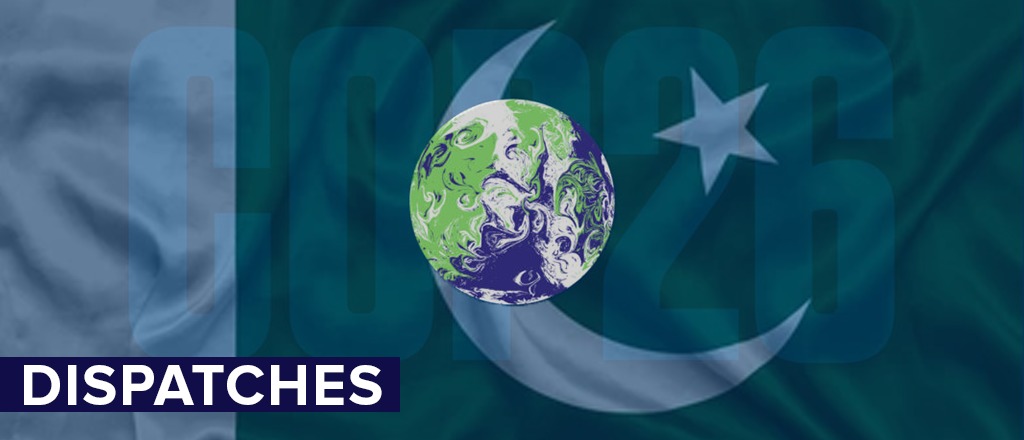

Kashmala Kakakhel specializes in international policy on climate finance. She has over 14 years of experience working with governments and development partners in Pakistan, Afghanistan, Bangladesh, Malawi, Kenya, Mexico, Myanmar and Nepal.
04.11.2021
Delegates from over 190 countries with different economies, different problems and different agendas are convening in Glasgow this November to agree a way forward on tackling climate change. This is not the first time, but the 26th year for the United Nations to convene these climate talks.
What is the purpose of these talks, one may wonder.
The impacts of climate change do not respect geographic boundaries; therefore, countries need a platform to discuss who is responsible for causing climate change, who has been most impacted and who needs to pay whom to address the effects.
The speed at which these talks progress is questioned by many groups internationally. Science started warning the policy makers about the dangers of extremely high levels of carbon emissions in the atmosphere over four decades ago, but the immediate gains in terms of economic development for policy makers always out weighted the potential disasters in some distant future.
That future, however, is already upon us. The impacts in the shape of extreme events are already in plain sight. In July 2021, a public poll surveyed 30,000 individuals across 31 countries for BBC World Service. It concluded that 61% of respondents believe governments hold “a great deal” of responsibility to address climate change. Decades later, with this level of public scrutiny, climate change is becoming a popular priority agenda for governments, developed and developing countries alike.
What it all boils down to then is assigning responsibilities and corresponding actions to respective countries. Enter climate politics.
Over the 4 decades, broadly 4 sets of countries have emerged. The first set is the “early polluters”, the ones that emitted the most carbon during their industrialization phase in the early 70s – the US, Europe, Japan, Canada, and Australia. Irresponsible usage of fossil fuels to power their economies, these countries set the standards for unprecedented release of carbon into the atmosphere. The second set of countries are the emerging economies, the ones that were late to the development trajectory, but are emitting heavily now. This set includes China, India, Russia, and Brazil.
The third set are the ones least prepared to deal with the climate crisis owing to low capacities within these countries. Least Developing Countries, Small Developing Island states are categorised under this set. The fourth set is countries that have limited carbon emissions and comparatively, the trajectory isn’t as devastating as of countries in the second category. These countries are generally able to manage climate disasters within their own resources. Pakistan belongs to this group.
Belonging to this group has political implications at the climate table.
Since we do not fall in the second category, Pakistan’s emission are of little interest to the global community and therefore under no direct pressure on this front – for now. At the other end, when impact is being discussed, the third set of countries take centre stage, with little focus on solving Pakistan’s climate vulnerabilities.
How are these talks then relevant to Pakistan?
The answer lies outside climate negotiations. Pakistan has the capability to engage on focused issues within the larger scope of climate talks. It needs to build further on that capability to maintain technical lead on those issues. Keeping that leverage will allow Pakistan to seek foreign policy gains outside the climate context. Some of these issues include negotiations on climate finance, nature-based solutions, market approaches, and the compliance regime.
This year, the annual climate meeting taking place in Glasgow is being viewed with renewed global interest for a particular reason: the race to net-zero emission targets.
The back story: Paris Agreement, a global deal on climate change signed off in 2015, includes pledges from all countries. It was a bottom-up approach, where all countries were expected to share their commitments (technically referred to as the Nationally Determined Contributions – NDCs). These included unconditional actions (undertaken through domestic resources), and conditional actions (subject to availability of international funding). When all national commitments were added up, the global temperature was still projected to rise significantly above the required limit of 1.5 degree Celsius by 2100. This limit has been prescribed by science if we want to reduce catastrophic impacts.
In an attempt to close this gap, the Paris Agreement also agreed that every five years, countries will raise their ambitions by submitting revised commitments. Glasgow marks the first five-year cycle.
Most countries, including Pakistan, have submitted revised NDCs. Current pledges, if realised, set us on a collective trajectory of 2.7 degree Celsius, still way above the required levels. Science also tells use that in order to achieve the 1.5 degree temperature target, global net carbon emissions will need to reach ‘net zero’ by 2050 – the total amount of emissions produced will have to be removed from the atmosphere at a global level.
Suddenly the bottom up NDCs, which were designed to be based on national circumstances, are not so bottom up anymore. There is a strong push for all countries to start aligning themselves to the net-zero emission target, whether you can afford it or not.
What are the lessons for Pakistan from this meeting? Two angles.
One, any international commitments we make, should be based on our domestic requirements and capacities, as opposed to making international commitments first, and then aligning our domestic resources to those commitments. Let’s remember, Pakistan is in the third set of countries with no heavy carbon reduction liabilities.
Two, agreements made in the climate rooms are beginning to have repercussions on all aspects of a country’s economy. It is beginning to have impact on trade, international borrowing, as well as foreign direct investments. Pakistan needs to take a very close look at these developments and start securing its economic interests within the climate domain.
Disclaimer: The views expressed in the article are of the author and do not necessarily represent the institute’s policy.
